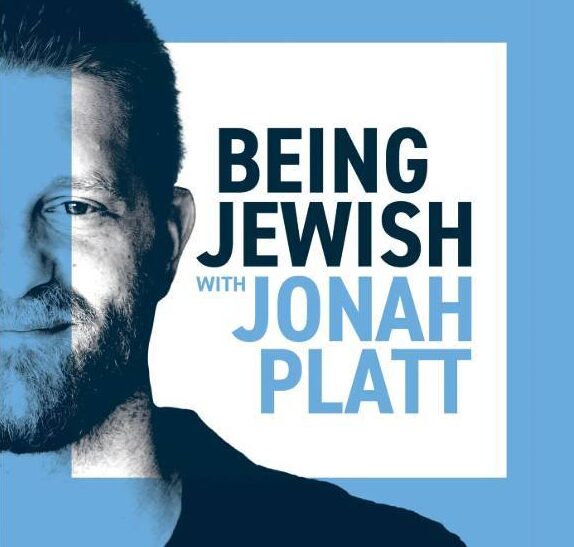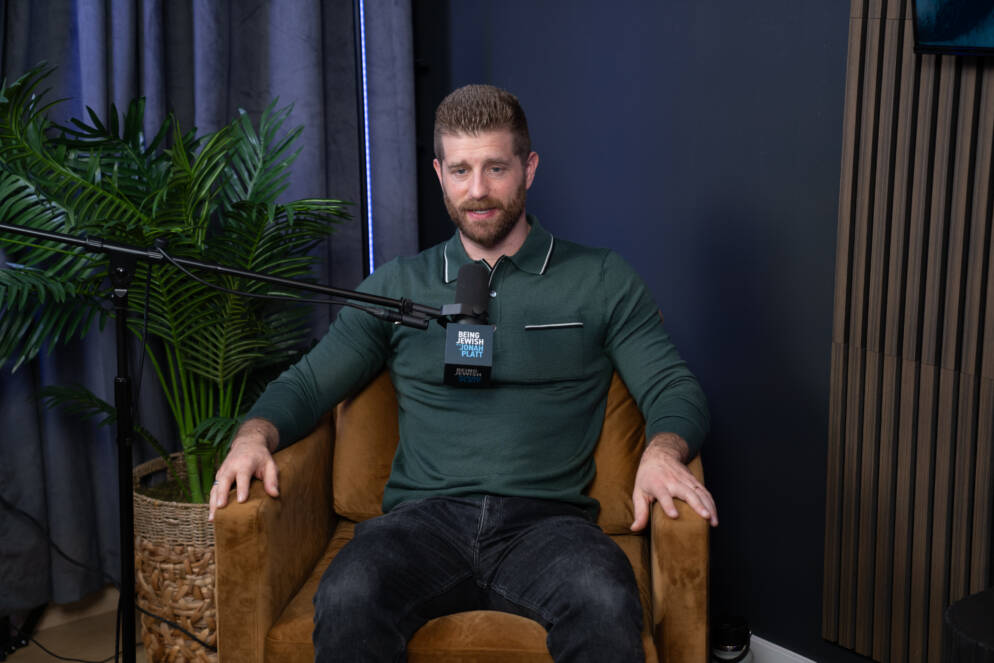 Jonah Platt is an actor, podcast host and Jewish activist. (Photo courtesy of “Being Jewish With Jonah Platt”)
Jonah Platt is an actor, podcast host and Jewish activist. (Photo courtesy of “Being Jewish With Jonah Platt”)
Jonah Platt is an actor who has appeared on Broadway and alongside some of the biggest names in entertainment, but nowadays, that part of his life isn’t the focus.
Today, he hosts a podcast called “Being Jewish with Jonah Platt,” which is one of the most listened to Jewish podcasts in the country. Ahead of an event at the Weitzman National Museum of American Jewish History in Philadelphia at which he will record an episode live, he said that he feels like he has found his purpose.
“I was very focused on my career and entertainment, and then Oct. 7 happened, and I found that I was spending all of my time and energy in this space trying to educate, trying to cut through the noise and explain things, trying to listen to people and help them understand and feel better, trying to put out fires in real life and online,” Platt said. “After a couple of months of that, I felt like I wanted to stop being so reactive and defensive and get back to my core Jewish advocacy, which has always been about empowerment and celebrating Jewish identity and making Jews feel good about being Jewish in a public way.”
Platt said that a podcast seemed like the right way to do this, and the public has agreed. “Being Jewish” is well-received and has featured guests like Jewish comedian Tiffany Haddish, Facebook COO Sheryl Sandberg and American-Israeli chef Michael Solomonov, who owns several acclaimed restaurants in Philadelphia and beyond.
The event at the Weitzman will be a special one, and a full-circle moment for Platt, and not just because museum namesake Stuart Weitzman has been a guest on “Being Jewish.” Platt graduated from the University of Pennsylvania, and said he has spent more time in the City of Brotherly Love than any other, save for his native Los Angeles or New York, where the theater world is based.
 Platt’s podcast has garnered lots of attention from the Jewish community in recent years. (Photo courtesy of “Being Jewish With Jonah Platt” and the Weitzman National Museum of American Jewish History)
Platt’s podcast has garnered lots of attention from the Jewish community in recent years. (Photo courtesy of “Being Jewish With Jonah Platt” and the Weitzman National Museum of American Jewish History)
“I’ll have friends from college who will come to the event, and it’ll be great to be walking those familiar streets,” Platt said. “Any excuse to go to Philly is a good one for me.”
The live taping of “Being Jewish with Jonah Platt” will be held on Wednesday, Sept. 17, with the doors opening at 6 p.m. and the event starting at 7 p.m. General admission costs $40, or $35 for museum members. There are VIP tickets that include a meet and greet for $60, as well. The event will feature guests, although those guests haven’t been announced yet.
The podcast has seen steady growth, with the metrics indicating that it is on the up-and-up, Platt said. There are now several members of the team behind “Being Jewish,” as opposed to when it was a one-man operation in the beginning. Many of these folks were listeners who just reached out to Platt and said they wanted to be a part of the podcast.
“What I love the most is the way that it’s helping people. I get so much feedback from folks as it continues, and it has really become a sort of home for a lot of people,” he said.
“Finding and meeting new people in new communities and hearing their voices is very fulfilling and inspiring to me, and that’s what keeps me doing it.”
Listeners run the entire spectrum of Jewish life. Platt has heard from Orthodox rabbis in Israel who love the show, as well as one lone Jew in the Midwest who just found out their father was Jewish a few years ago and wants to embrace the culture. He hears from LGBTQIA Jews, as well as non-Jews who want to better understand Jewish life. For Platt, celebrating Jewish joy, especially right now, is essential.
“My show’s about how much we love being Jewish and how great being Jewish is, and how it doesn’t just need to be about current events or what other people think of us,” he said.
In mid-September when the event is held, Platt is excited to return to Philadelphia and feel the energy of a live crowd. He reflected on his time in the city as a student, remarking that it serves as a model for what many Jews hope to get out of life in the United States, or anywhere.
“It was normal [to be Jewish]. The Jewish community, as any community would hope to be, was just purely integrated into this tapestry of all the different communities and kinds of people at Penn,” he said. “We were all just one big student body, and that’s what I think we should hope for.”